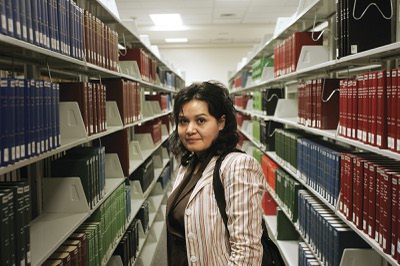Sunday, April 19, 2009 | 2 a.m.

With concerns about state budget cuts and quality of life in Las Vegas, UNLV law professor Raquel Aldana is one of three William S. Boyd School of Law professors leaving for other jobs. She and her husband have a young child, and she has concerns about the schools in Nevada. "I have to ask, 'Is this a place where I can raise my child?' "
Sun Coverage
Sun Archives
Beyond the Sun
UNLV’s William S. Boyd School of Law is losing three highly regarded professors, and faculty sources said several others are looking elsewhere.
Professors Raquel Aldana and Tuan Samahon, considered rising stars on the faculty, said they are leaving in part because they question Nevada’s commitment to education in the face of a proposed 36 percent cut in higher education in Gov. Jim Gibbons’ budget.
They also both have young children and said they worry that Southern Nevada’s struggling schools will fall further behind given other proposed cuts.
A third young professor, Michael Higdon, is leaving for the University of Tennessee to be closer to family, but he echoed his colleagues’ view that the law school’s rapid rise in national rankings is threatened by budget cuts.
The Boyd School of Law is a bright spot in Nevada’s higher education system. Just a decade old, Boyd has a top 100 ranking among law schools and has become known for recruiting both up-and-coming and veteran legal scholars.
All three departing professors are considered engaging instructors and prolific scholars, their colleagues said.
Samahon said he counts six additional faculty members — of a total of 40 or so — who have interviewed elsewhere. That means nearly a quarter of the faculty are leaving or considering it. Two others have decided to go from full-time to part-time, he said.
The departures create an immediate challenge for the young law school. Boyd will have to try to attract new talent and keep the remaining top professors here even as the Legislature considers deep budget cuts.
Beyond the immediate, the departures also raise the specter of a troubling trend that transcends the university system. After years of incremental progress in drawing young college graduates to the state, Nevada could be suffering the beginning stages of a “brain drain,” as educated professionals go elsewhere because their jobs are threatened or because they question whether Nevada can provide good schools for their children and health care when they get sick.
Boyd School of Law Dean John Valery White acknowledged the challenging environment. He said with so many talented young faculty, some turnover is inevitable. He said the law school is committed to attracting and retaining top talent.
“One of the components of my job is to build a strong faculty, but not under the assumption that we wouldn’t have any turnover,” White said.
He noted that quality of life challenges are not unique to Las Vegas. White came to Boyd from Louisiana State University in Baton Rouge, where some difficulties in attracting and retaining talent were similar, he said.
Richard Morgan, the founding dean who is now of counsel at Lionel Sawyer & Collins, said the economic climate is challenging, but must be kept in context. He noted that other states are cutting higher education budgets, and private university endowments have been shredded by the recession.
“I think people at the law school are pleased and have a good feeling about the esprit de corps and team effort in building a good law school,” Morgan said. “I’m sad to see those faculty leave because they’re good people, but you’re always going to see people leave for professional or personal reasons.”
The state’s higher education system is expected to take a significant cut in its funding, as Nevada confronts the largest budget shortfall — 30 percent — of any state in the union, according to a recent study.
The alternative to cutting, a big tax hike, is not an option in an ailing economy, said Dan Burns, a spokesman for Gibbons, the first-term Republican who opposes any tax increase to make up the state’s huge budget shortfall.
“The economy is in a deep crisis,” Burns said. “There are layoffs everywhere. Thousands of people don’t know whether they’re going to get their next paycheck. The money is just not there.”
Gibbons is proposing a 36 percent cut in the higher education system budget, including cuts of 50 percent each at UNLV and University of Nevada, Reno. He also is proposing a 6 percent cut in public school teacher salaries.
Still, Burns said, “No one should question the governor’s commitment to education.”
Samahon has doubts.
He’s accepted an offer at Villanova University, the Augustinian institution outside Philadelphia.
He and his wife have 5-year-old twins and were attracted to the excellent school district in the area.
Samahon, who had a prestigious federal clerkship on the U.S. Court of Appeals for the 9th Circuit, said he sees two ways to build a class of college-educated professionals.
One is to draw them from elsewhere. Nevada does so by luring them with low taxes, he said.
“But my sense is that a lot of professionals are not motivated solely by pecuniary interests,” Samahon said. “There are other things that are more appealing than low taxes. Decent infrastructure. Medical care. Excellent schools.”
The other way to produce educated professionals is to grow your own, he said. The advantage of a strong law school is that many of the graduates stay here, bolstering the supply of lawyers for business, government and social service groups, he said. He noted that something like one-third of the pro-bono work for Legal Aid of Southern Nevada is provided by Boyd graduates.
“They do a huge amount of good in this state,” he said.
Samahon’s thoughts extended beyond education. He said he and his wife had “mixed experiences” with doctors here. He described the health insurance benefits as “terrible.”
Higdon, who also clerked on the 9th Circuit, is a Boyd graduate. He said his time here has been “tremendously positive,” but added that Nevada will have to continue to invest to keep up: “Part of the rankings are how visible and well known you are, and that takes money.”
Aldana, who has been at UNLV for nearly a decade, has accepted a position at University of the Pacific McGeorge School of Law.
Without money, UNLV will have difficulty helping talented and ambitious professors develop innovative programs, Aldana said.
“It’s a solid program with a solid reputation and wonderful people here,” she said. “That’s not foreclosed, but it could be challenged by whether they can retain talent and also draw new people by allowing professors to be entrepreneurial about new programs.”
Aldana echoed many of Samahon’s criticisms. She, too, has a young child: “I have to ask, ‘Is this a place where I can raise my child?’ ”
She said that UNLV, once it has resources again, should become more family-friendly in its recruiting, offering opportunities to spouses.
At McGeorge, Aldana will be director of an inter-American program that will seek to build ties between the legal communities of the U.S. and Latin America.
Jim Rogers, chancellor of the Nevada System of Higher Education, said he was saddened by the departures, though not surprised. Rogers is in a tough fight for more money at the Legislature.
“What you’re seeing is a reasonable reaction to the general attitude of Nevadans, which is, education just isn’t that important,” he said.


Join the Discussion:
Check this out for a full explanation of our conversion to the LiveFyre commenting system and instructions on how to sign up for an account.
Full comments policy